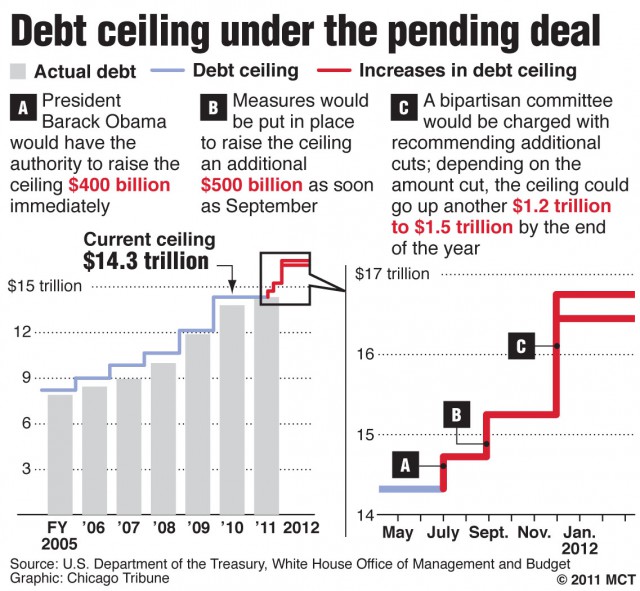
WASHINGTON — With the deadline for raising the
nation’s debt ceiling only hours away, the Senate Tuesday passed by a
74-to-26 vote an historic deficit-reduction package that aims to cut
trillions of dollars from federal spending while increasing the nation’s
debt limit immediately.
The bill’s next stop is President Barack Obama, who has pledged to sign it.
Few supporters were completely satisfied with the compromise that had taken months to achieve.
“On this matter my conscience is conflicted,” said
Senate Assistant Majority Leader Richard Durbin, D-Ill. “If this bill
should fail, we will default on our nation’s debt … terrible things
will ensue.” But he also worried about its trillions of dollars in
spending cuts and “all of the consequences on innocent people in
America.”
The Senate Republican leader, Mitch McConnell of
Kentucky, was a bit more upbeat. “We’ve had to settle for less than we
wanted, but what we’ve achieved is in no way insignificant. And we did
it because we had something Democrats didn’t. Republicans may only
control one half of one third of the government in Washington. But the
American people agreed with us on the nature of the problem,” he said.
“And if you’re spending yourself into oblivion, the solution isn’t to spend more, it’s to spend less.”
The Senate action followed the Monday vote in the
House of Representatives, when a bipartisan majority also approved the
deal. In the House, 174 House Republicans and 95 Democrats voted for the
measure, and 66 Republicans and 95 Democrats voted against it.
The mood in the Senate was similar to that in the House — reluctant acceptance of the package.
“To say the legislation before us is not ideal is truly an understatement,” said Sen. Carl Levin, D-Mich.
But he added, “despite its many flaws, the legislation must pass.”
Conservatives and liberals, though, had different reasons for opposing the measure.
“At the end of the day, this bill allows Washington
to continue business as usual in the irresponsible way it spends
hard-earned tax dollars.,” said Sen. James Inhofe, R-Okla.
From the left, Sen. Bernard Sanders, I-Vt., had a different complaint.
“The wealthiest people in this country and the
largest corporations who are doing phenomenally well today are not being
asked to contribute one penny in shared sacrifice toward deficit
reduction,” he said.
“On the other hand, middle-class and working families
who are suffering terribly in the midst of this horrible recession are
being asked to shoulder 100 percent of the human cost of lowering our
deficit. This is not only grossly unfair, it is bad economic policy.”
The agreement would cut deficits by $917 billion over
10 years, according to an analysis by the nonpartisan Congressional
Budget Office. Those reductions would allow the debt limit to be raised
by $900 billion, which is expected to be enough to last through early
next year.
About $350 billion would come from defense spending.
The rest would come from cuts to a variety of domestic programs, such as
education, housing and transportation. Medicare, Medicaid and Social
Security wouldn’t be cut.
A second series of reductions, totaling as much as
$1.5 trillion, would be subject to a vote by late December. A special
bipartisan joint congressional committee will recommend specifics.
The committee must make recommendations by Nov. 23, and Congress must vote on them by Dec. 23.
If those recommendations aren’t approved on
up-or-down, non-amendable votes in Congress, programs would be cut
automatically across the board — half from defense, half from
non-defense — starting in 2013. Social Security, Medicaid, military and
civilian pensions, and most low-income programs would be exempt.
Medicare cuts would be restricted to payments to providers, and limited.
Once the reductions are made, the debt limit would go
up by at least another $1.2 trillion, which is expected to allow the
government sufficient borrowing authority through 2012.
———
(c) 2011, McClatchy-Tribune Information Services.
Visit the McClatchy Washington Bureau on the World Wide Web at www.mcclatchydc.com.














